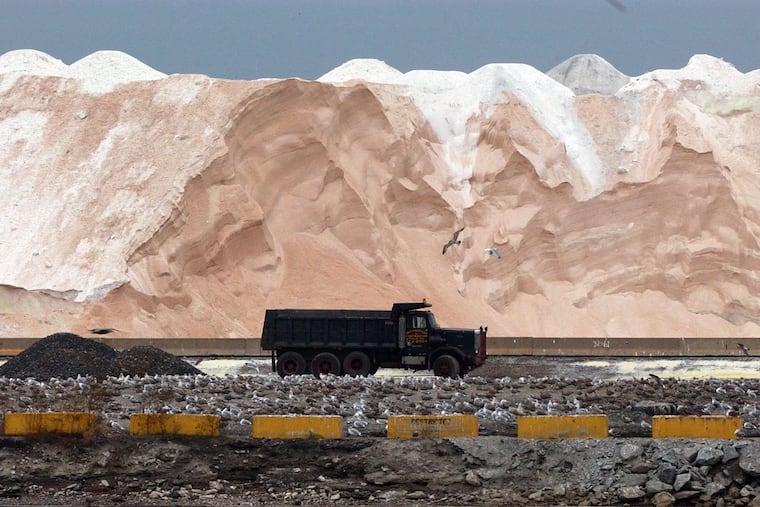Road salt can be toxic, and we’re using too much of it | Opinion
Let’s consider alternatives (beet juice?) and find ways to judge how much we really need, perhaps via GPS or roadside trackers.

My first bad experience with road salt came when I was 12. I was sitting in the passenger seat of my father’s ‘95 Saab on the 202 bypass in Bucks County when a large salt truck cut in front of us. The truck was spreading sodium chloride, which comes in particularly large pellets. Without time to swerve, we drove through the flying pellets, some of which hit our windshield and cracked it.
Thankfully, no one was hurt. But the immediate shock of the pellets hitting our car was so jarring, it inspired me to start researching the overall effects of road salt. In the years since, I’ve learned that road salt can pose much more danger than a cracked windshield.
Don’t get me wrong: I love salt (especially on McDonald’s fries). And research has shown that road salt can reduce accidents by 78%.
My problem with road salt is its overuse by the Pennsylvania Department of Transportation and other road authorities. As something that affects the health and tax dollars of all Pennsylvanians, every resident should know about the detrimental effects of road salt, so we can do something about it before it’s too late.
“As something that affects the health and tax dollars of all Pennsylvanians, every resident should know about the detrimental effects of road salt, so we can do something about it before it’s too late.”
Even as our winters get warmer, due to an increase in the transport of goods and services, the use of road salt has increased all over the country. Did you know that PennDot spreads an average of 807,766 tons of salt each year? With nearly 40,000 miles of roads under PennDot’s purview, that’s about 20 tons per mile of road. That can’t all be necessary. Indeed, I have frequently noticed some freeways which are inexplicably salted throughout the winter, even on sunny, non-icy days.
Pennsylvania’s roads are among the worst-maintained in the nation, and most Pennsylvania taxpayers and drivers are likely already concerned about PennDot’s use of its money. But the debate over road salt goes beyond a mismanaging of operations.
Road salt is toxic to our waterways. When large amounts of it run off the asphalt into local creeks and ponds, it can kill animals and their eggs and larvae, wreaking havoc on populations of fish, turtles, and frogs. And its effect on our drinking water cannot be understated: In Flint, Mich., scientists believe that the lead water crisis was exacerbated by salt running through old pipes.
» READ MORE: Road salt levels in some Philadelphia-area streams hit toxic levels
Many of us in the region are already concerned about our drinking water due to levels of the “forever chemical” known as PFAS, yet little thought or legislation has been allotted to road salt. After all, isn’t the whole point of spreading road salt to save lives?
Given how effective salt is at preventing accidents, I don’t propose discarding it altogether. But we have to explore and consider its damaging effects, including on our drinking water.
We need to implement alternative methods of salt-spreading, ones that perhaps utilize GPS and roadside trackers to assess how much should be used. And let’s experiment with salt alternatives, such as beet juice.
These changes begin with everyone. Have you spread road salt on your sidewalk? If it’s concrete, that road salt can create small holes in your sidewalk, which will expand over time and damage its structural integrity. This hurts the environment and your wallet.
Pennsylvanians, people and animals alike, deserve better from PennDot, but many of us can try to make changes ourselves. Next time it’s icy, consider exploring this list of household alternatives to road salt. Try shoveling! (Or at least be understanding when the snow plows take awhile.)
This issue has so many potential solutions. Let’s implement them, and hopefully, the Department of Transportation will follow suit.
Simrin Ponamgi is a sophomore at Columbia University. She is from Doylestown.